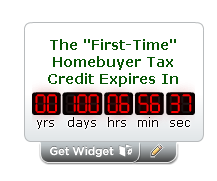NOTE: Mortgage rates quoted in this post from April 2010 are outdated and no longer valid. For a current mortgage rate quote for a home located anywhere in Washington, please click here. Also, other programs available since this post was published.
I recently had someone getting ready to buy their first home ask me if $10,000 would be enough for a down payment. If she had served in the military, she could possibly qualify for a zero down VA loan; this was not an option for her. USDA loans also offer 100% financing but the area she’s considering is not classified as rural.
An FHA loan will currently allow her to buy a home with as little as 3.5% of the sales price. Until this summer*, sellers can contribute up to 6% of the sales price towards allowable closing costs and prepaids (*in a few months, this will be reduced to 3%).
So how much with $10,000 buy? How about a sales price of $285,000. Here’s how that pencils out.
$285,000 x 3.5% required minimum down payment = $9,975. This is the buyers minimum required investment if utilizing an FHA insured loan. A parent can gift funds towards this amount, but the seller cannot.
The rate (as of writing this post 4/28/2010) for an FHA insured 30 year fixed mortgage is 5.000% assuming we’re closing in 30 days (APR 5.620) and priced with zero points to help keep the closing costs down. Pricing the loan with zero points means that you’re asking the seller to contribute $2,750 less than they would if your rate was priced with a point (1% of the loan amount). This may make your offer more acceptable.
Based on this scenario, if the Seller contributes $5,500 towards allowable closing cost and prepaids, you’ll wind up needing approximately $10,000 for your down payment and remaining closing costs.
I did use 6 months for property taxes, which will vary depending on when your first mortgage payment is due. And I used 15 days of prorated interest which is based on closing in the middle of the month. Closing towards the end of the month reduces the prorated interest (your cost)…of course the trade off is that you don’t own the property until it’s closed.
The total monthly payment, including PITI and mortgage insurance, is going to be around $2,000 (depending on interest rate, taxes and home owners insurance). My scenario has a payment of $1981.
In addition to your down payment, you may be required to have reserve funds after closing of at least two months proposed mortgage payments. Based on this scenario, that would be around $4,000 in the bank (stocks, 401k, etc) after closing.
Also of note, your first payment will not be due until the month after closing unless you close on an interest credit. This is a great opportunity to “pay yourself” by putting that mortgage or former rent payment into your savings account. Owning a home does come with expenses…some not always planned.
If you are interested in buying a home located in Washington state, I’m happy to help. Please contact me or apply on-line by clicking the tab at the top this page.
 One benefit of FHA insured mortgages is that they are assumable to qualified buyers. This means that if you have an FHA insured mortgage at today’s low rates and you’re selling your home during a higher mortgage rate environment, being able to offer a lower rate to potential buyers could provide a distinct advantage over other competing listings.
One benefit of FHA insured mortgages is that they are assumable to qualified buyers. This means that if you have an FHA insured mortgage at today’s low rates and you’re selling your home during a higher mortgage rate environment, being able to offer a lower rate to potential buyers could provide a distinct advantage over other competing listings. 








Recent Comments